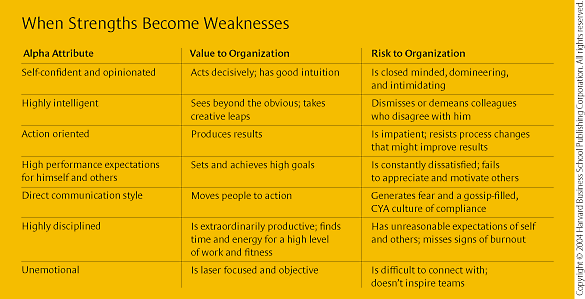How to be an Alpha Male ?
How to be an Alpha Male ?
Then why do so many of them need executive coaches?
As it turns out, alphas’ quintessential strengths are also what make them so challenging, and often frustrating, to work with. Independent and action oriented, alphas take extraordinarily high levels of performance for granted, both in themselves and in others. As one business journalist observed after meeting Jack Welch and Andy Grove in a single week, “Jeez, are they impressive and stimulating! But am I glad I don’t work for them.”
The alphas we’ve worked with think very fast, and this rapid processing can prevent them from listening to others—especially those who don’t communicate in alphaspeak. Their impatience can cause them to miss subtle but important details. Alphas, moreover, have opinions about everything, and they rarely admit that those opinions might be wrong or incomplete. Early in life, alphas realize that they are smarter than most people, smarter perhaps than even their parents and teachers; as adults they believe that their insights are unique and so put complete faith in their instincts.
Alphas require skilled coaches because it’s difficult for them to ask for help or even to acknowledge that they need it. They’re typically stubborn and resistant to feedback. After all, they haven’t gotten where they are by being self-reflective. As much as they love talking about accountability, they often fail to see that their own communication style, rather than someone else’s shortcomings, is what’s creating the roadblock. They’re uncomfortable showing vulnerability or taking a break from constant action. The coaching process can make them feel unproductive and out of control.

kuku ka jadu
ReplyDelete